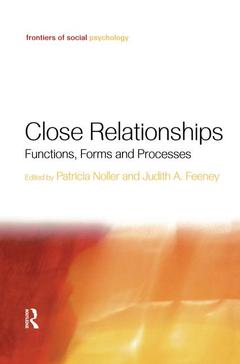Description
Close Relationships
Functions, Forms and Processes
Frontiers of Social Psychology Series
Language: English
Keywords
romantic; marital; satisfaction; partners; secure; attachment; relational; maintenance; style; strategies; Young Men; Sibling Relationship Qualities; Attachment Avoidance; Animal Kingdom; St Ag; Perceived Partner Responsiveness; Divorce Stress Adjustment Perspective; APIM Analysis; Stress Buffering Model; Relational Maintenance Strategies; Relational Maintenance; Antisocial Behavior; Close Genetic Relative; Relationship Maintenance; Close Relationship Contexts; Relational Maintenance Behaviors; Relational Transgressions; Adaptive Problems; Relational Dissolution; Sexual Attitudes Scale; Situational Couple Violence; Emotion Programs; Intimate Conflict; Relational Maintenance Research; Mate Choice
Publication date: 06-2014
Support: Print on demand
Publication date: 07-2006
416 p. · 15.2x22.9 cm · Hardback
Description
/li>Contents
/li>Biography
/li>Comment
/li>
Close Relationships: Functions, Forms and Processes provides an overview of current theory and research in the area of close relationships, written by internationally renowned scholars whose work is at the cutting edge of research in the field.
The volume consists of three sections: introductory issues, types of relationships, and relationship processes. In the first section, there is an exploration of the functions and benefits of close relationships, the diversity of methodologies used to study them, and the changing social context in which close relationships are embedded. A second section examines the various types of close relationships, including family bonds and friendships. The third section focuses on key relationship processes, including attachment, intimacy, sexuality, and conflict.
This book is designed to be an essential resource for senior undergraduate and postgraduate students, researchers, and practitioners, and will be suitable as a resource in advanced courses dealing with the social psychology of close relationships.
Introduction. Section I. Introductory Issues. Chapter1. The needs, benefits, and perils of close relationships. J. A. Simpson & S. Tran. Chapter 2. The changing social context of relationships. C. M.Bryant, J. M. Bolland, L. Burton, T. Hurt, & B. M.Bryant. Chapter 3. Studying close relationships: Methodological Challenges and Advances. J. A. Feeney. Section II - Types of Relationships. Chapter 4. Marital relations. P. Noller. Chapter 5. Parent-child relationships: Contemporary Perspectives. R. D. Parke,K. Morris, T. Schofield, M. Leidy, M. Miller, & M. Flyr.Chapter 6. Parent-adolescent relationships. W. A.Collins & B. Laursen. Chapter 7. Sibling relationships in childhood and adolescence. S. M McHale, J. Kim, & S. Whiteman. Chapter 8. Adult friendship: A Decade Review. K. Ueno & R. G. Adams. Chapter 9. Interethnic relationships. S. O. Gaines Jr., R. A. R. Gurung, Y.Lin,& N. Pouli. Section III. Relationship Processes . Chapter 10. Attachment across the lifepan. C. Hazan,M. Campa, & N. Gur-Yaish. Chapter 11. Intimacy and the self: An Iterative Model of the Self and Close Relationships. S. L. Gable & H. T. Reis. Chapter 12. Passionate love, sexual desire, & mate-selection: Cross-cultural & Historical Perspectives. E. Hatfield &R. L. Rapson. Chapter 13. Mate-selection: Adaptive Problems and Evolved Cognitive Programs. D. Lieberman. Chapter 14. Sexuality in close relationships. S.Sprecher. Chapter 15. Emotion and cognition in close relationships. J. Fitness. Chapter 16. What partners do to maintain their close relationships. K. Dindia & T.M. Emmers-Sommer. Chapter 17. From bickering to battering: Destructive Conflict Processes in Intimate Relationships. Linda J. Roberts. Chapter 18. Relationship dissolution: Antecedents, Processes and Consequences. A. L. Vangelisti




